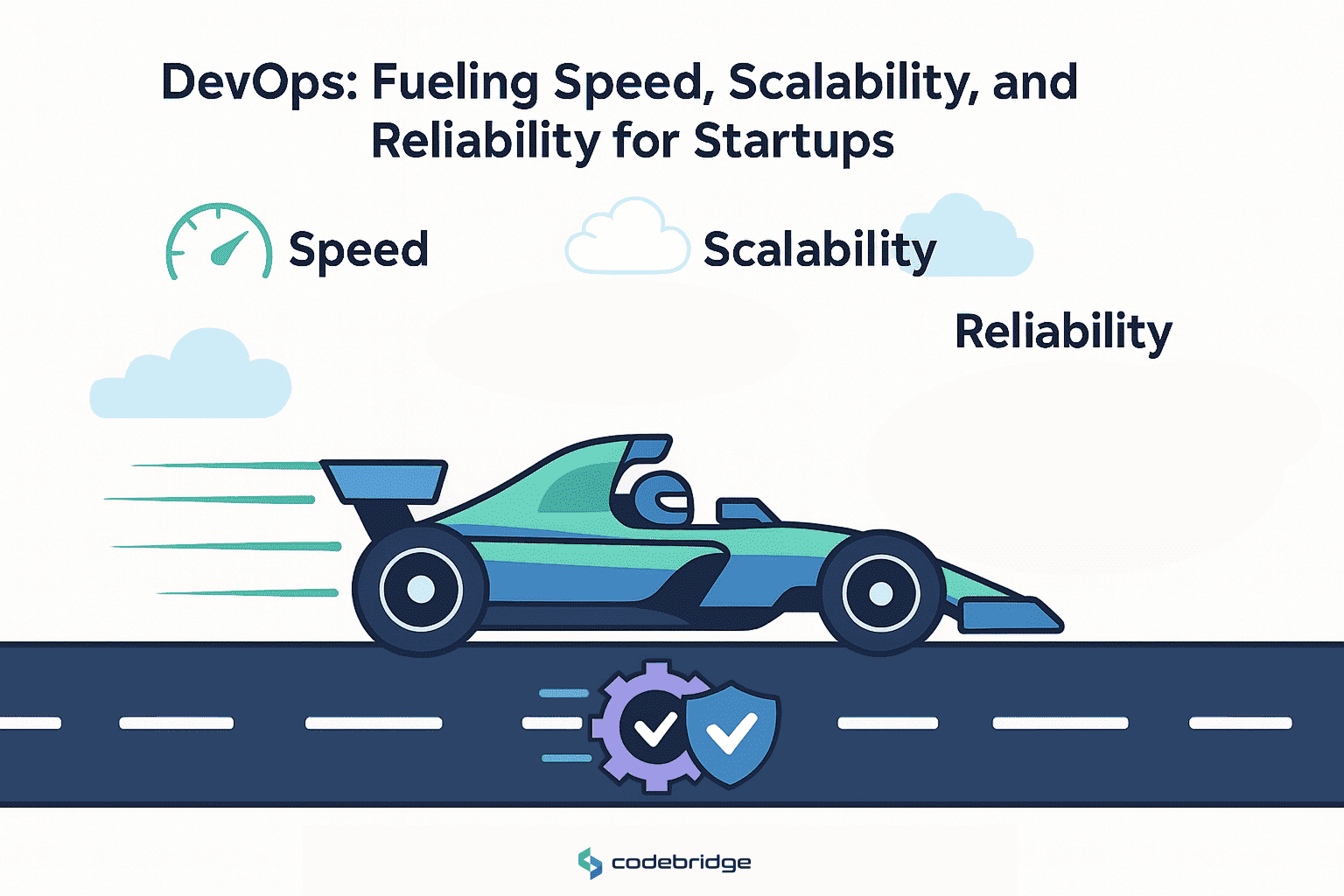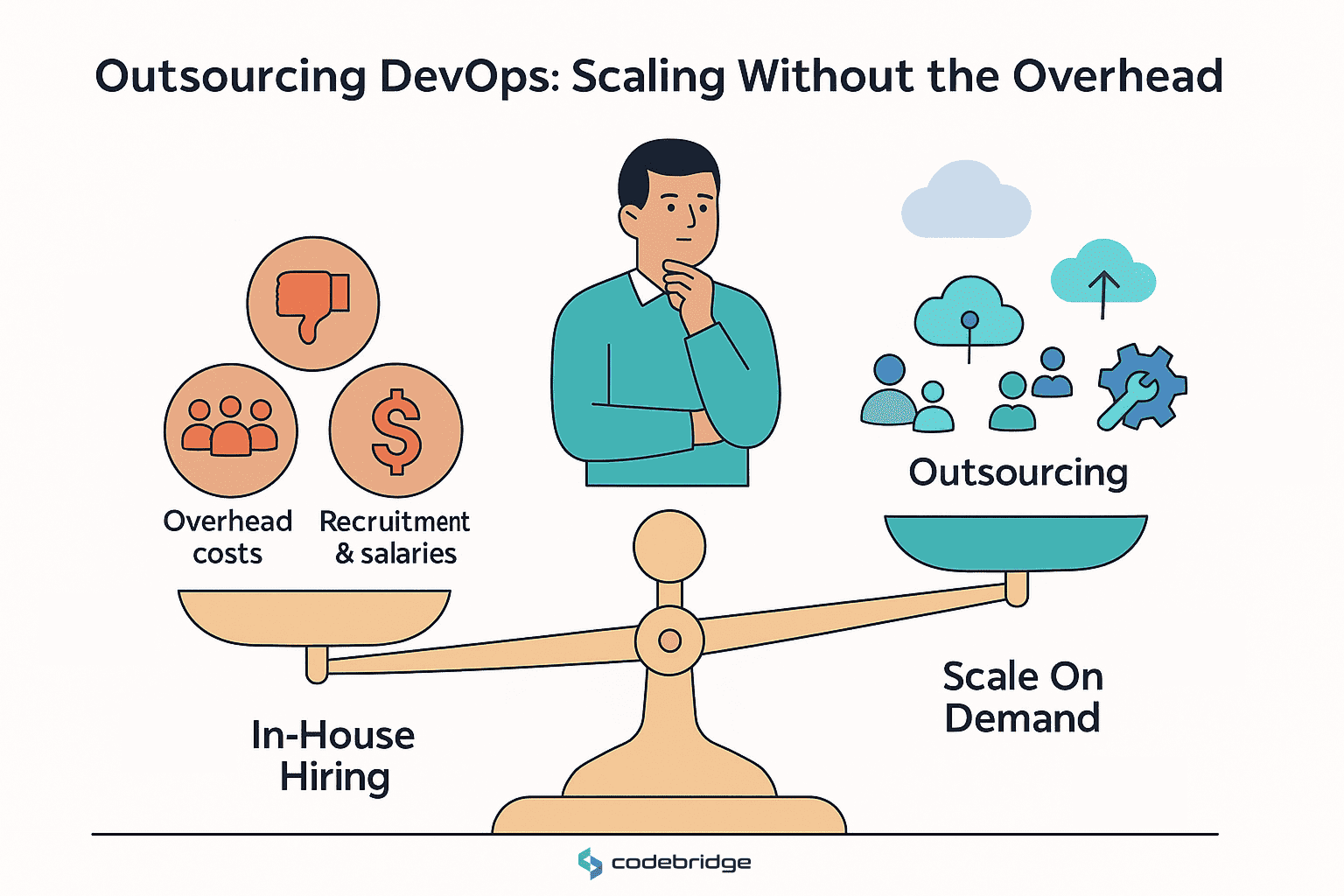Startup CTOs, often juggling lean teams, tight deadlines, and limited budgets, are increasingly turning to DevOps services as strategic partners.
DevOps merges development (Dev) and operations (Ops) into a cohesive, automated workflow, enabling startups to move faster and smarter. Rather than building everything from scratch in-house, many CTOs now rely on DevOps outsourcing to gain access to seasoned professionals who bring best practices, tools, and infrastructure expertise. The result? Faster time-to-market, fewer system outages, better team collaboration, and a more resilient technology stack.
This guide unpacks why DevOps service providers have become indispensable to modern startups. We'll explore what DevOps means for startups, the benefits of outsourcing, the challenges CTOs face, and how to pick the right provider. Buckle up, it’s time to scale smartly.
%20(1).png)
What is DevOps, and Why It Matters for Startups?
Startups are built for speed, innovation, and disruption. But none of that is sustainable without a solid tech foundation, and that’s where DevOps for startups comes into play. DevOps service providers bridge the gap between rapid development and reliable operations, ensuring startups can scale without breaking.
The Core Principles of DevOps
DevOps is more than just tooling; it’s a cultural and operational philosophy that fosters collaboration, automation, and continuous improvement. At its core, DevOps emphasizes:
- Continuous Integration (CI): Developers frequently commit code to a shared repository, where it’s automatically tested and integrated.
- Continuous Delivery (CD): Code changes are automatically prepared for release, enabling rapid and safe deployments.
- Automation: From code testing to infrastructure provisioning, automation reduces errors and speeds up workflows.
- Monitoring and Feedback: Real-time analytics and logging help teams spot issues before they escalate.
DevOps service providers specialize in embedding these principles into a startup’s ecosystem, offering tailored solutions that align with the company's growth stage and tech stack.
Why DevOps is Essential for Fast-Paced Startup Environments
For a startup, time is money. Delays in product releases, bugs in production, or server downtimes can be catastrophic. Startups also typically operate with minimal staff, often without dedicated ops engineers. That’s where DevOps becomes a game-changer.
According to Grand View Research, global development to operations market size was valued at USD 11.3 billion in 2022 and is expected to expand at a compound annual growth rate (CAGR) of 16.8% from 2023 to 2030.This rapid growth underscores how indispensable DevOps practices have become, especially in fast-moving, high-growth environments like startups.
Here’s how DevOps support this pace:

- Speed: DevOps enables faster development and deployment cycles, letting startups release features weekly or even daily.
- Reliability: Automated testing and monitoring catch issues before they reach users.
- Scalability: Cloud-native DevOps setups grow with the startup, adapting to changing traffic and usage.
- Efficiency: Teams focus on building products, not managing infrastructure.
DevOps for startups isn’t just a nice-to-have; it’s a survival tool. And with service providers offering plug-and-play expertise, CTOs can sidestep the steep learning curve and hit the ground running.
The Key Benefits of Partnering with a DevOps Service Provider
Whether you're launching a new app or scaling an MVP, partnering with a DevOps service provider gives you access to a wealth of benefits that can catapult your startup ahead of the competition. Let’s break down what makes this partnership so valuable.
Speeding Up Product Development with Continuous Integration and Delivery (CI/CD)
One of the standout benefits of DevOps service providers is their ability to implement streamlined CI/CD pipelines. With CI/CD in place:
- Code changes are tested and deployed automatically, reducing the risk of human error.
- New features and updates are released faster and more reliably.
- Developers get immediate feedback, which accelerates debugging and improvement.
For startups, this means less time between ideation and implementation. When a small team pushes code daily, manual testing and deployments are bottlenecks. DevOps solutions for startups automate those processes, freeing engineers to focus on innovation.
Moreover, CI/CD enhances customer satisfaction. Faster releases = quicker value delivery = happier users. It’s a win-win.
Ensuring Scalability and Flexibility with DevOps Best Practices
Startups grow unpredictably. One day, you have 100 users; the next, 10,000. Without proper infrastructure planning, that growth can crash your servers. Enter DevOps best practices.
DevOps service providers build scalable environments using technologies like Docker, Kubernetes, and Terraform. They also implement cloud strategies such as auto-scaling, load balancing, and disaster recovery, which ensure your system grows as your customer base does.
More importantly, their expertise helps avoid common pitfalls. Instead of reacting to outages, you proactively plan for scale. This level of foresight is what separates fast-growing startups from failed ones.
How DevOps Service Providers Help Startups Overcome Common Challenges
Startup CTOs are no strangers to firefighting, limited resources, tight timelines, unpredictable scaling demands, and pressure to launch faster than ever. These hurdles can be overwhelming, especially when DevOps isn’t a core competency within the team. That’s where DevOps service providers come in offering expertise, automation, and scalability that startups desperately need to stay competitive.
Overcoming Resource Limitations Through Outsourcing
One of the biggest advantages of DevOps outsourcing for CTOs is the ability to sidestep the hiring struggle. Finding experienced DevOps engineers is tough and expensive. Outsourcing brings immediate access to a fully equipped team with diverse skill sets, CI/CD, cloud infrastructure, container orchestration, security compliance, and more.

Here’s what outsourcing brings to the table:
- Cost savings: You pay for what you use, avoiding full-time salaries and overheads.
- On-demand scalability: Easily ramp up or scale down your DevOps efforts based on your startup’s needs.
- Speed: Get to production faster with an experienced partner who already knows what works.
This flexibility is ideal for early-stage companies needing agility without long-term commitments. Rather than spending months building an internal team, CTOs can start executing their vision immediately with external experts who’ve done it all before.
Addressing Scalability and Reliability Concerns
Startups often hit a ceiling when their infrastructure isn’t built to handle growth. Slow load times, downtime during traffic spikes, and manual deployments create bottlenecks that frustrate users and slow growth. Scaling with DevOps isn’t just about handling more users, it’s about doing it efficiently and securely.
DevOps service providers offer:
- Load testing and stress simulations to prepare systems for peak traffic.
- Cloud-native architectures that support horizontal scaling.
- Automated infrastructure provisioning using IaC (Infrastructure as Code) for repeatability.
This ensures your startup can meet demand without compromising performance. Most importantly, it prevents costly outages that can damage your reputation and stall momentum.

Key Considerations When Choosing a DevOps Service Provider for Your Startup
Not all DevOps partners are created equal. As a startup CTO, selecting the right provider can make or break your DevOps journey. Beyond technical skills, you need someone who understands startup dynamics, speed, flexibility, and innovation.
Evaluating Expertise and Experience in Startup Environments
When choosing a DevOps service provider, look for proven experience with startups. Ask potential providers:
- Have you worked with early-stage companies before?
- Can you share case studies or testimonials?
- What startup-specific challenges have you solved?
You want someone who understands lean teams, MVP development, rapid deployment cycles, and pivoting on the fly. Generic enterprise DevOps experience won’t cut it; startups play a different game, and your partner should speak that language fluently.
Also, evaluate their technical stack:
- Are they proficient in your preferred cloud provider (AWS, Azure, GCP)?
- Do they use modern tools like Docker, Kubernetes, Jenkins, Terraform, and Ansible?
- Can they support your CI/CD needs from day one?
Choosing a provider who’s already familiar with your tools saves you onboarding time and minimizes friction.
Importance of Cultural Fit and Communication in DevOps Partnerships
Technical expertise is only half the equation; DevOps for startups also demands strong collaboration and communication. Your DevOps partner becomes an extension of your team, so cultural fit matters.
Consider:
- Time zone overlap: Will you be able to communicate in real-time?
- Language and communication skills: Are they clear, responsive, and proactive?
- Alignment with your startup’s values and pace: Do they thrive in fast-moving, dynamic environments?
A good DevOps partner doesn’t just deliver tasks; they advise, strategize, and grow with you. Regular check-ins, shared dashboards, and agile workflows ensure you’re always on the same page.
DevOps Service Provider Models: In-House vs. Outsourced
When it comes to implementing DevOps, startups often face a fundamental decision: Should we build an in-house team or partner with external experts? Both paths have their merits, but the best choice often depends on your startup’s size, stage, and long-term goals.
In-House DevOps Teams: When to Build Your Own vs. Outsourcing
Building an internal DevOps team gives you full control over processes, tools, and security protocols. It’s a great option for mature startups with:
- Stable revenue streams
- Long-term roadmaps
- Complex, proprietary infrastructure
But it’s also expensive and time-consuming. You’ll need to:
- Recruit and retain scarce talent
- Invest in ongoing training
- Manage overhead costs
For early-stage startups, this may not be feasible. That’s why many choose to outsource DevOps initially, then transition to an internal team as they scale.
A hybrid approach also works: start with a DevOps service provider to get things rolling quickly, and gradually build internal capacity as your needs stabilize.
The Value of Outsourcing DevOps Services to Experts
DevOps outsourcing for CTOs brings immediate value:
- Speed to execution: Launch in weeks, not months.
- Reduced risk: Rely on experts who’ve solved similar challenges before.
- Flexibility: Scale your DevOps capabilities as your startup grows.
Outsourcing also frees your internal team to focus on what they do best: product development, customer experience, and innovation. Your external DevOps team handles the infrastructure, so your engineers can build amazing things without distraction.
Startups don’t have the luxury of time. That’s why outsourced DevOps isn’t just a workaround, it’s a strategic advantage.

How DevOps Drives Innovation and Growth for Startups
One of the most compelling reasons startup CTOs are turning to DevOps service providers is the direct impact DevOps has on innovation and business growth. Startups thrive on speed, flexibility, and the ability to quickly respond to market demands. DevOps enables all of this and more by creating a development culture that’s agile, experimental, and continuously evolving.
Continuous Improvement and Innovation Through DevOps Practices
In the startup world, failing fast and iterating quickly is key. DevOps, at its core, is designed to support this agile model. Through DevOps best practices, startups benefit from:
- Shorter development cycles: Updates and new features can be delivered in days, not weeks or months.
- Real-time monitoring and feedback: Get instant insights into user behavior and system performance.
- Automated testing and deployments: Reduce bugs and eliminate downtime.
- Feedback loops: Quickly test hypotheses and refine product features based on data.
This culture of continuous improvement is a massive boon for startups. It empowers teams to try new things without fear, learn from failures, and deliver better products faster.
By partnering with DevOps service providers, startups also gain access to expert-level workflows and methodologies that are proven to fuel innovation. These aren’t just theoretical frameworks; they’re real-world strategies applied by teams who’ve helped startups grow from zero to millions of users.
Adapting to Market Changes and Scaling Your Startup Efficiently
Markets shift fast. User preferences evolve. Technology changes overnight. Without a flexible development and deployment process, startups risk falling behind. DevOps helps you stay ahead by making your infrastructure and development pipelines resilient and adaptable.
Here’s how scaling with DevOps supports sustainable growth:
- Elastic infrastructure: Automatically scale resources based on demand.
- Microservices architecture: Make your application modular so updates can be rolled out independently.
- Version control and rollback: Roll back a bad release instantly without affecting users.
- Cloud-native solutions: Move faster, reduce costs, and stay flexible with cloud platforms.
Startups that invest in these practices early, especially with help from DevOps service providers, are better positioned to adapt to new challenges and opportunities. They can launch new features, pivot business models, and enter new markets with confidence.
Final Thoughts: Is Your Startup Ready to Embrace DevOps?
By now, it’s clear why DevOps service providers are becoming the go-to choice for startup CTOs. Whether you’re launching your MVP or scaling your product to meet a global audience, DevOps can dramatically improve your chances of success.
The question isn’t “Do we need DevOps?” it’s “How fast can we implement it?”
Here’s a quick recap of why DevOps solutions for startups are mission-critical:
- Speed and agility: DevOps accelerates development and deployment.
- Reliability and scalability: Build systems that handle traffic surges with ease.
- Cost-efficiency: Outsourcing eliminates overhead and unlocks premium talent.
- Collaboration and innovation: Teams work better together, iterate faster, and respond to feedback more effectively.
If your startup is ready to embrace modern development practices, it’s time to explore DevOps, not as a toolset, but as a strategic driver of growth.
The right DevOps service provider will not only implement the technology but also guide your team through cultural and operational transformation. So don’t wait until you’re facing downtime, scaling failures, or slow release cycles. Be proactive. Start your DevOps journey now and future-proof your startup.
FAQ
Why are startup CTOs increasingly partnering with DevOps service providers?
Startup CTOs are partnering with DevOps service providers because these experts offer immediate access to advanced automation, deployment best practices, and reliable cloud infrastructure management. This allows startups to accelerate development, reduce operational risks, and avoid the time-consuming process of building an internal DevOps team.
How do DevOps service providers help startups improve product delivery speed?
DevOps service providers implement optimized CI/CD pipelines, automate repetitive processes, and streamline deployment workflows. As a result, engineering teams can release updates faster, respond to customer feedback quickly, and shorten time-to-market for new features.
What efficiency benefits do startups gain from working with DevOps experts?
When startups work with DevOps specialists, they gain improved workflow automation, standardized development environments, and reduced manual errors. This leads to higher developer productivity, fewer production issues, and more time dedicated to core product innovation rather than operational troubleshooting.
How does partnering with DevOps professionals support scalability for growing startups?
DevOps professionals build scalable, cloud-native architectures that automatically adjust to traffic demands. By implementing containerization, orchestration tools, and robust monitoring systems, they ensure startups can scale smoothly while maintaining high performance and reliability.
Why is outsourcing DevOps more cost-effective than building an in-house team?
Outsourcing DevOps is more cost-effective because startups avoid recruitment costs, training expenses, and long onboarding cycles. Instead, they gain instant access to a full team of experts for a predictable monthly cost, allowing them to allocate budgets more efficiently and focus on strategic growth.
How do DevOps service providers improve security and reliability for startup products?
DevOps providers integrate security into the development lifecycle through automated testing, continuous monitoring, and proactive vulnerability detection. They also set up high-availability systems and disaster recovery processes, ensuring that startup applications remain stable, secure, and resilient.

















